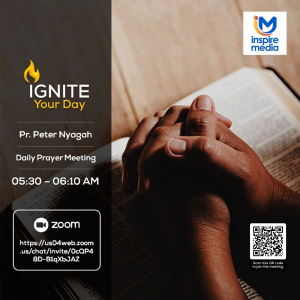
Saturday Mar 01, 2025
5 February 2025_IGNITE YOUR DAY: Healing Emotional Wounds – Jephthah, the Outcast Who Became a Leader
IGNITE YOUR DAY: Healing Emotional Wounds – Jephthah, the Outcast Who Became a Leader
Our scripture passage today comes from Judges 11:1-40, summarizing the life of Jephthah. However, our key thoughts are drawn from the first few verses:
Key Text: Judges 11:1-40
11 Jephthah the Gileadite was a mighty warrior. His father was Gilead; his mother was a prostitute. 2 Gilead’s wife also bore him sons, and when they grew up, they drove Jephthah away. "You will have no inheritance in our family," they said, "because you are the son of another woman." 3 So Jephthah fled from his brothers and settled in the land of Tob, where a group of outcasts gathered around him and followed him.
Today, we turn our attention to an often-overlooked Bible character, Jephthah. Unlike more commonly discussed figures, his story holds remarkable lessons about rejection, resilience, and redemption. Tomorrow, we will explore another lesser-known biblical character whose journey also offers transformative insights.
The Wounds of Family Rejection
Family is meant to be a source of healing, support, and love. However, many people bear deep wounds inflicted by their own family members. The story of Jephthah is one of rejection, abandonment, and persecution—yet, it is also a story of grace, redemption, and leadership.
As we examine Jephthah’s life, we see that unresolved emotional wounds can lead to tragic decisions. Despite being used by God to deliver Israel, Jephthah carried deep-seated wounds that influenced his actions, ultimately leading to great personal loss.
Jephthah’s Journey: From Rejection to Leadership
1. A Mighty Warrior with a Painful Past
Jephthah is introduced as a mighty man, yet immediately, his background is marked by stigma. The Bible states that he was the son of a prostitute, and his father, Gilead, later had legitimate sons with his wife. When these sons grew up, they forcefully drove Jephthah away.
This rejection was not merely verbal—it was harsh and merciless, echoing the rejection of other biblical figures like Hagar (cast out by Abraham) and Joseph (sold into slavery by his brothers).
2. Emotional Wounds and Identity Struggles
Jephthah likely battled feelings of unworthiness even before being expelled from his home. The prolonged mistreatment from his half-brothers would have reinforced his sense of shame and alienation.
He may have asked himself:
"Who am I?"
"Why was my mother a prostitute?"
"Do I truly belong in this family?"
His mother’s past defined how others saw him, leading to deep emotional pain. The stigma was not just personal but societal—he was branded by circumstances beyond his control.
3. Betrayed by Those Who Should Have Protected Him
His half-brothers, who should have been his protectors, became his persecutors. Their words were cruel:
"You shall have no inheritance in our father’s house, for you are the son of another woman."
Jephthah experienced the pain of betrayal—denied his rightful inheritance and stripped of his legal family rights. The emotional impact of such betrayal was profound, leaving him with a deep sense of abandonment.
4. Forced into Displacement
Stripped of his home, Jephthah was forced to leave and settle in a foreign land. He faced displacement, rejection, and uncertainty.
What wrong had he done to deserve this?
What mistake did he make?
His only "fault" was being born into a situation beyond his control.
5. Redemption and Leadership
Despite his painful past, Jephthah’s story does not end in rejection. Later in Judges 11, the very people who cast him out sought his leadership in a time of crisis. His resilience and strength, forged through adversity, positioned him for a role of deliverance.
However, his unresolved wounds influenced his decisions, leading to tragic consequences—a sobering reminder that healing is crucial.
Lessons from Jephthah’s Story
Rejection does not define your destiny – Even if people reject you, God can still use you mightily.
Healing is essential – Unresolved emotional wounds can lead to harmful decisions.
God’s grace is sufficient – No matter your background, His purpose for your life remains intact.
Forgiveness and restoration are possible – Let go of bitterness and trust God for healing.
Final Thoughts
Who among us has not faced rejection or emotional wounds in some form? Whether from family, friends, or society, these experiences can shape our self-worth. Yet, Jephthah’s story reminds us that God sees beyond our past and calls us to something greater.
As we journey through this series on healing and forgiveness, may we open our hearts to God’s restoration. No matter the wounds we carry, His love can heal and redeem us.
Take a moment to reflect:
Are there wounds from your past that still influence your decisions today?
Have you allowed God’s healing to transform your pain into purpose?
May today be a step toward healing and freedom.
No comments yet. Be the first to say something!